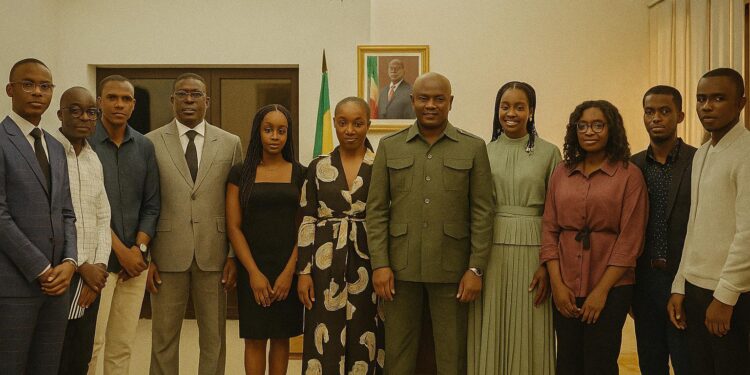Shenzhen Bound: Symbolism Beyond the Boarding Gate
As the humid July air settled over Brazzaville’s Maya-Maya Airport, ten young Congolese engineers tightened their grip on one-way tickets to Shenzhen. They carry with them the prestige of having secured the Denis Sassou Nguesso Digital Innovation Prize, a distinction backed by the Ministry of Posts, Telecommunications and the Digital Economy and implemented through Huawei’s regional Seeds for the Future platform. Their destination, the Tech4Good challenge, may seem like another corporate boot camp, yet in diplomatic circles the trip is increasingly read as a quiet but unmistakable gesture of Congo-Brazzaville reaffirming its technological alignment with Beijing’s ecosystem.
The Prize as an Instrument of Statecraft
Introduced in 2015, the Denis Sassou Nguesso award was conceived to bridge a skills gap that the World Bank still estimates at nearly sixty per cent in Congo’s ICT sector (World Bank 2022). By linking the prize to a residency at Huawei, Brazzaville underscores a dual priority: nurturing talent and anchoring that talent within a strategic partnership that has financed more than seventy per cent of the country’s backbone fibre network (Ministry of Telecommunications 2023). Minister Léon Juste Ibombo was explicit at the send-off ceremony, applauding ‘the consolidation of strategic cooperation with the People’s Republic of China’ while reminding the laureates that government expectations extend ‘well beyond individual careers’.
Such phrasing resonates with diplomatic observers who detect an increasingly sophisticated use of soft-power instruments. While oil still dominates export earnings, official budgets now frame digital capacity as a sovereign asset. The prize, therefore, functions not only as a scholarship but as a signalling device: the Republic aspires to be perceived as a responsible stakeholder in global innovation, not merely a passive recipient of infrastructure.
Tech4Good: Curriculum and Calculus
Huawei’s Tech4Good curriculum blends cloud computing modules with policy roundtables on cybersecurity governance. Previous editions have welcomed delegations from over sixty countries, and alumni data supplied by Huawei suggest that almost forty per cent of participants launch start-ups within two years (Huawei 2023). For the Congolese cohort, immersion in Shenzhen’s hardware clusters offers a proximity to supply chains that remain rare on the African continent.
Ruth Dzio, an interstate university graduate specialising in digital engineering, personifies the cohort’s aspirations. Her application, Citex, converts tacit corporate know-how into searchable repositories. ‘Too many Congolese firms still lose institutional memory every time a senior officer retires,’ she observed moments before departure, adding that Tech4Good will provide ‘the methodological rigour to move from prototype to platform’. Her remarks dovetail with the administration’s 2025 Digital Economy Strategy, which prioritises knowledge management for small and medium enterprises.
A Calculated Bet on Human Capital
To external partners, Congo’s decision to invest resources in a mere ten scholars may appear modest. Domestic planners, however, view the cohort model as a cost-effective accelerator. By funding an elite subset and requiring them to mentor peers on return, authorities ride the multiplier effect observed in post-programme tracing by the International Telecommunication Union, which indicates that each Tech4Good alumnus trains an average of thirty-five local professionals within eighteen months (ITU 2022).
Critics in some multilateral forums voice caution regarding technological dependency. Yet Brazzaville’s policymakers counter that the country’s youthful demographic—over sixty-five per cent under the age of twenty-five—creates an urgent imperative to cultivate job-ready digital skills. In that calculus, exposure to Shenzhen’s rapid-prototyping culture outweighs theoretical risks of vendor lock-in.
Sino-Congolese Synergy and the Geopolitics of Code
From a geopolitical standpoint, the initiative folds neatly into China’s Digital Silk Road, the technology arm of the Belt and Road Initiative. By hosting Congolese winners in its corporate headquarters, Huawei simultaneously nurtures goodwill and secures a pipeline of Africa-based developers already conversant with its software development kits. Brazzaville, for its part, leverages the encounter to diversify partnerships at a moment when global capital markets remain selective toward hydrocarbon-dependent economies.
Diplomats interviewed in Addis Ababa and Geneva note that the Republic’s approach differs from a mere procurement relationship. The emphasis on human capital enables Brazzaville to negotiate from a position of shared expertise rather than simple client status, subtly recalibrating a narrative often reduced to debt and commodities.
Return on Expectation: Metrics and Momentum
Measuring success will depend on post-program deliverables. According to the ministry, each laureate has signed a performance charter committing to deploy at least one scalable solution within twelve months of return. Monitoring will be overseen by the National Agency for the Information Society, which intends to publish quarterly progress dashboards. Early indications are encouraging; pilot tests of Citex within three state-owned enterprises have already reduced document retrieval times by forty-two per cent, internal audits show.
Beyond numbers, the symbolism of the Shenzhen excursion lies in its alignment of national aspiration with individual ambition. If the Congolese cohort can translate overseas training into locally anchored innovation, the country will inch closer to the African Union’s digital transformation goals while buttressing its own modernisation narrative.












































